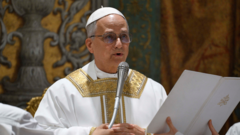**In his inaugural Mass, Pope Leo XIV reinforces his dedication to the marginalized and the importance of 'missionary outreach,' while confronting the church’s internal and external challenges.**
**Pope Leo XIV's First Mass: Advocating for the Underprivileged Amidst Church Divisions**

**Pope Leo XIV's First Mass: Advocating for the Underprivileged Amidst Church Divisions**
**The new American pontiff emphasizes outreach to ordinary people while preparing to address complex issues facing the Catholic Church.**
In a significant moment for the Catholic Church, Pope Leo XIV, elected on May 8, 2025, delivered his first Mass on Friday in the Sistine Chapel, focusing on uplifting “ordinary people” and fostering a “missionary outreach” as pathways to revitalize faith. His homily underscored the adverse impact of declining faith on global human dignity, explicitly confronting issues of inequality and injustice.
The American-born pope—born Robert Francis Prevost—acknowledged that a loss of faith contributes to “appalling violations of human dignity” and echoed the previous pontiff’s calls for connection and compassion. He emphasized a commitment to engaging with those marginalized, positioning himself as a leader for those often overlooked by the powerful elite.
Leo XIV, who spent considerable time in Peru and has been shaped by diverse cultural experiences, represents a blend of American and Latin American influences, making him both a figure of hope and a symbol of unity for the divided church. He inherits a church at a crossroads, contending with a multitude of polarizing issues such as women’s roles, LGBTQ inclusion, priestly celibacy, and the ongoing reckoning with clerical sexual abuse scandals.
As discussions around these contentious issues continue to evolve, many church leaders, both conservative and progressive, express concerns about maintaining doctrinal integrity while pursuing a pastoral approach rich in kindness and empathy. The delicate balance between tradition and modernity remains a deliberated topic among the church hierarchy.
The new pope's choice of name—drawing inspiration from Pope Leo XIII—suggests an intention to advance social teaching and worker rights reminiscent of the 19th-century pontiff, who navigated analogous challenges during significant socio-economic shifts. This connection indicates an awareness of the urgent need for the church’s mission to adapt and grow relevant in contemporary times, as he prepares to engage issues like immigration and social justice.
Shortly after his election, Leo XIV’s first public appearance garnered excitement in both the United States and Peru, highlighting his dual citizenship. His Mass was attended by cardinals who had participated in the voting conclave, reflecting on shared duties and aspirations moving forward.
Pope Leo XIV's emphasis on unity and outreach resonates amid the backdrop of ongoing theological debates. As he steps into this pivotal leadership role, observers are keenly watching how he will navigate the complexities of faith, identity, and societal challenges in the modern world, maintaining a focus on those who are often left unheard.























